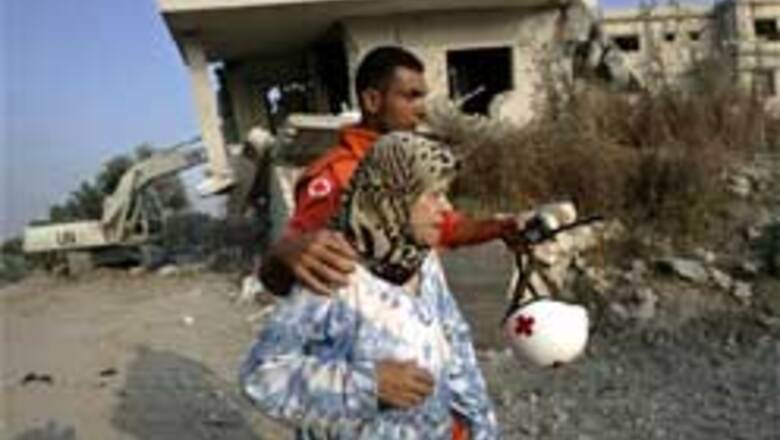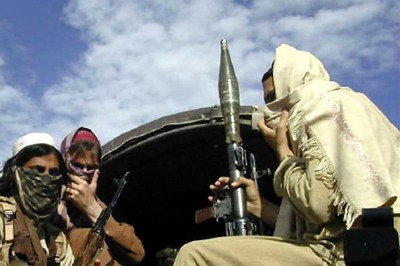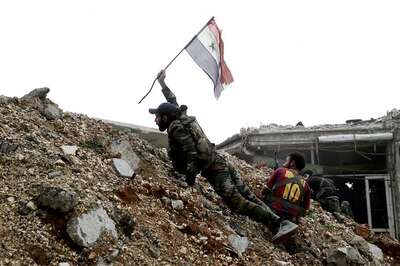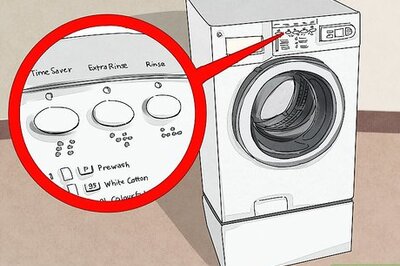
views
New Delhi: The crisis in West Asia worsened following the bloodiest single Israeli airstrike on the Lebanese hamlet of Qana. At least 54 civilians were killed, including 37 children.
Thousands protested outside the United Nations headquarters in Beirut.
Lebanon told US Secretary of State Condoleezza Rice to stay away from Beirut.
The UN called an emergency meeting where the Lebanese representative called for an immediate ceasefire.
Reacting to withering world criticism, Israel agreed to a 48-hour suspension of airstrikes in Lebanon after a Sunday bombing killed at least 56 Lebanese, most of them women and children, leveling a building where they had taken shelter from earlier Israeli attacks.
The stunning bloodshed in the village of Qana escalated international pressure on Washington to back an immediate end to the fighting and prompted US Secretary of State Condoleezza Rice to cut short her West Asia mission.
The announcement of the pause in overflights - first made by the State Department - appeared to reflect American pressure on Israel to make a concession after the strike. Israeli officials confirmed that Israel had agreed to the pause.
However, the officials left open the possibility that Israel might hit targets to stop imminent attacks on Israel, and that the suspension could last less than 48 hours if the military completes its inquiry and interpretation before then.
The officials, speaking on condition of anonymity because they were not authorized to talk to reporters, said Israel would allow opening of corridors for 24 hours for Lebanese civilians who want to leave south Lebanon for the north and would maintain land, sea and air corridors for humanitarian assistance.
The attack on Qana brought Lebanon's death toll to more than 510 and pushed American peace efforts to a crucial juncture, as fury at the United States flared in Lebanon. The Beirut government said it would no longer negotiate over a US peace package without an unconditional ceasefire.
At the United Nations, the Security Council approved a statement expressing ''extreme shock and distress'' at the bloodshed and calling for an end to violence, stopping short of a demand for an immediate cease-fire.
PAGE_BREAK
In Qana, workers pulled dirt-covered bodies of young boys and girls - dressed in the shorts and T-shirts they'd been sleeping in - out of the mangled wreckage of the three-story building. Bodies were carried in blankets and sheets, one decorated with Raggedy Ann and Andy drawings.
Two extended families, the Shalhoubs and the Hashems, had gathered together in the house for shelter from another night of Israeli bombardment in the border area when the 1 a.m. strike brought the building down.
''I was so afraid. There was dirt and rocks and I couldn't see. Everything was black,'' said 13-year-old Noor Hashem, who survived, although her five siblings did not. She was pulled out of the ruins by her uncle, whose wife and five children also died.
Israel apologized for the deaths but blamed Hezbollah guerrillas, saying they had fired rockets into northern Israel from near the building.
The UN Security Council held an emergency meeting to debate a resolution demanding an immediate cease-fire - a step Washington has stood nearly alone at the council in refusing until the disarmament of Hezbollah is assured.
In a jab at the United States, UN chief Kofi Annan told the council in unusually frank terms that he was ''deeply dismayed'' his previous calls for a halt were ignored. ''Action is needed now before many more children, women and men become casualties of a conflict over which they have no control,'' he said.
After news of the deaths emerged, Rice telephoned Lebanese Prime Minister Fuad Saniora and said she would stay in Jerusalem to continue work on a peace package, rather than make a planned Sunday visit to Beirut. Saniora said he told her not to come.
Rice decided to cut her West Asia trip short and return to Washington on Monday morning.
British Prime Minister Tony Blair, who only days earlier gave his support to the US stance, struck a more urgent note Sunday, saying Washington must work faster to put together the broader deal it seeks.
''We have to get this now. We have to speed this whole process up,'' Blair said. ''This has got to stop and stop on both sides.''
PAGE_BREAK
But Lebanon's Saniora said talk of a larger peace package must wait until the firing stops.
''We will not negotiate until the Israeli war stops shedding the blood of innocent people,'' he told a gathering of foreign diplomats. But he underlined that Lebanon stands by ideas for disarming Hezbollah that it put forward earlier this week and that Rice praised.
He took a tough line and hinted that any Hezbollah response to the airstrike at the village of Qana was justified. ''As long as the aggression continues there is response to be exercised,'' he said, praising Hezbollah's leader Sheik Hassan Nasrallah for his ''sacrifices.''
Lebanon demanded an international probe, and President Emile Lahoud derided the Israel one, saying ''A murderer wants to investigate himself?''
Hezbollah said on its Al-Manar television that it will retaliate, vowing, ''The massacre at Qana will not go unanswered.'' It hit northern Israel on Sunday with 157 rockets - the highest one-day total during the offensive - with one Israeli moderately wounded and 12 others lightly hurt, medics said.
The largest toll from a single Israeli strike before Sunday was around a dozen - and Sunday's dramatic deaths stunned Lebanese. Heightening the anger were memories of a 1996 Israeli artillery bombardment that hit a UN base in Qana, killing more than 100 Lebanese who had taken refuge from fighting. That attack sparked an international outcry that forced a halt to an Israeli offensive.
In Beirut, some 5,000 protesters gathered in downtown Beirut, at one point attacking a UN building and burning American flags, shouting, ''Destroy Tel Aviv, destroy Tel Aviv'' and chanting for Hezbollah's ally Syria to hit Israel. Another protest by about 50 people on a road leading to the US Embassy forced security forces to close the road there.
Images of children's bodies tangled in the building's ruins, being carried away on blankets or wrapped in plastic sheeting were aired on Arab news networks. The dead included at least 34 children and 12 women, Lebanese security officials said.
In Qana, Khalil Shalhoub was helping pull out the dead until he saw his brother's body taken out on a stretcher. ''Why are they killing us? What have we done?'' he screamed.
PAGE_BREAK
Israel said Hezbollah had fired more than 40 rockets from Qana before the airstrike, including several from near the building that was bombed. Foreign Ministry official Gideon Meir accused Hezbollah of ''using their own civilian population as human shields.''
It said residents of the village had been warned to leave, but Shalhoub and others in Qana said residents were too terrified to take the road out of the village. The road to the nearest main city, Tyre, is lined with charred wreckage and smashed buildings from repeated Israeli bombings.
More than 750,000 Lebanese have fled their homes in the fighting. But many thousands more are still believed holed up in the south - many of them too afraid to flee on roads heavily hit by Israeli strikes.
Israel on Sunday also launched its second significant ground incursion into southern Lebanon. Before dawn, Israeli forces backed by heavy artillery fire crossed the border and clashed with Hezbollah guerrillas in the Taibeh Project area, some three or four kilometers inside Lebanon.
Hezbollah said two of its fighters were killed. The Israeli military said eight soldiers were wounded.
Many in the Arab world and Europe see the United States as holding the key to the conflict, believing that Israel would have to stop its offensive - sparked by Hezbollah's July 12 abduction of two Israeli soldiers in a cross-border raid - if its top ally Washington insisted it had to.
The United States has balked at doing so, saying any cease-fire must ensure real and lasting peace.
Rice had come to the West Asia with a peace package that would call for the disarming of Hezbollah, release of Israel's soldiers, deployment of a UN-mandated force in south Lebanon and the establishment of a buffer zone along the border.
(With inputs from AP)




















Comments
0 comment